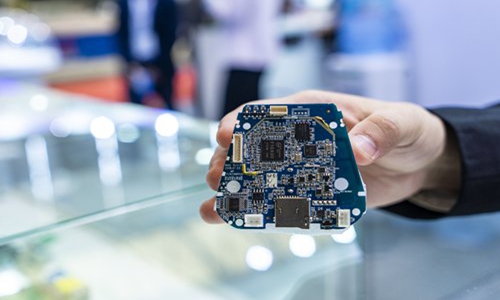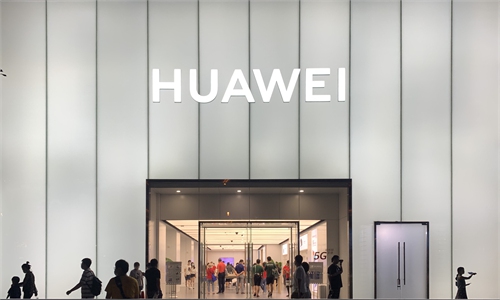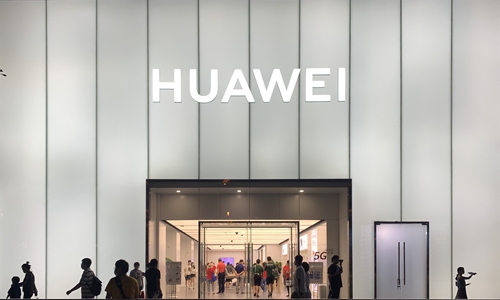SOURCE / INDUSTRIES
Huawei faces uncertain challenge
US supply ban unlikely to be lifted in short term

An employee showcases a semiconductor integrated circuit at an industry expo on October 31. Photo: VCG
With the US presidential election drawing to a close, and the financial report released on Thursday of a Chinese chipmaker Semiconductor Manufacturing International Corp (SMIC) showing record high quarterly revenue, Huawei and the semiconductor industry are again in the spotlight.
SMIC's earnings reached record high with the revenue hitting 7.638 billion yuan ($1.15 billion), growing 13 percent from the last quarter.
The incoming Joe Biden administration has decided to appoint someone close to the US semiconductor industry as the head of the Department of Commerce's Bureau of Industry and Security (BIS), Chinatechtales.com reported on Tuesday, citing an anonymous "well-placed source".
The BIS can add to the Entity List a foreign individual, business, research institution, or government organization, making it crucial to Huawei, which was put on the Entity List in May 2019.
Analysts said such an action does not mean that the US ban on Huawei will be relaxed, or that China's semiconductor industry will hear good news. China should keep sober.
"A smooth presidential power transition in the US is not assured yet. If Biden becomes president, he will most probably focus on fighting the COVID-19 at home. He may overturn some orders of the Trump administration, but the supply ban on Huawei is unlikely to be lifted in a short time. No matter what decision the US makes, China should continue to develop its own chips," Zhang Xiaorong, director of the Beijing-based Cutting-Edge Technology Research Institute, told the Global Times on Thursday.
Song Guoyou, deputy director of the Center for American Studies at Fudan University, also said it is too early to tell whether the incoming new US government will loosen restrictions on Huawei.
"The person taking charge of BIS does not decide who to put on the US Entity List. During the transition period of the US president, it is unsure if the US would relax its relentless crackdown on Huawei," Song told the Global Times on Thursday.
AMD, Intel and Samsung are among the world's largest chip producers that have obtained licenses to supply some chips to Huawei. The media had reported that the US had changed its mind and allowed a growing number of companies to supply Huawei, but only for chips for non-5G usage.
Qualcomm has obtained a license to supply Huawei, according to 36Kr on Tuesday, citing sources familiar with the matter.
"Even if Qualcomm can resume supplying chips to Huawei, it does not mean that Huawei's phone business is out of the woods. At the heart of Huawei's handsets are Kirin chips, designed by HiSilicon and made by Taiwan Semiconductor Manufacturing Co (TSMC), whose ban has not been lifted. As a result, Huawei phones still can't use its own chip design. If Huawei uses Qualcomm chips in its mobile phones, there will only be another high-end Xiaomi in the market, which will be a great boon to Qualcomm but not for Huawei," said Zhang.
According to Qualcomm's results, more than 48 percent of its revenue came from the Chinese market in 2019, making it eager to resume the supply of chips to Huawei to ensure its dominant position in the Chinese mobile phone chipset market.
Zhang added that Huawei produces its own 5G chips and has sufficient inventory.
The US ban on Huawei has had a domino effect on the semiconductor industry, with upstream and downstream suppliers affected. According to the latest sales report, TSMC saw a 6.5 percent month-to-month decline in October, after being hit by Huawei sanctions in mid-September.
While some analysts remain cautious on the US decision and the impact on China's semiconductor industry, some others expect changes.
Li Haidong, a professor at the Institute of International Relations of the Foreign Affairs University, said that Biden will not make changes to the complex situation between China and the US in the technology sector.
"However, what he may change is to reconsider in which areas can the two countries cooperate. On a business level, Biden may relax bilateral cooperation in areas that can bring US commercial interests, but in areas involving US core research and development, the two powers would still maintain a competitive relationship," Li told the Global Times.
"One thing is sure: Biden will not be the second Trump who strives peremptorily to beat Chinese companies to death," Li said.




